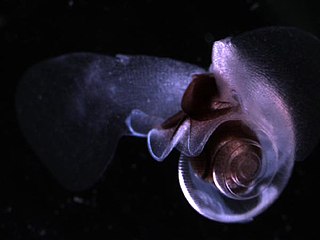
Sea butterflies, scientific name Thecosomata, are a taxonomic suborder of small pelagic swimming sea snails. They are holoplanktonic opisthobranch gastropod mollusks. Most Thecosomata have some form of calcified shell, although it is often very light and / or transparent.

Dall's porpoise is a species of porpoise endemic to the North Pacific. It is the largest of porpoises and the only member of the genus Phocoenoides. The species is named after American naturalist W. H. Dall.
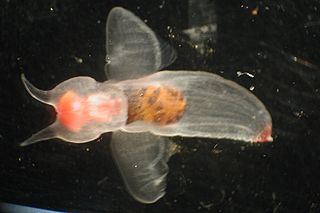
Sea angels are a large group of small free-swimming sea slugs, not to be confused with Cnidarians, classified into six different families. They are pelagic opisthobranchs in the clade Gymnosomata within the larger mollusc clade Heterobranchia. Sea angels were previously referred to as a type of pteropod.

Limacina is a genus of swimming predatory sea snails commonly known as sea butterflies in the family Limacinidae. This genus contains some of the world's most abundant gastropod species.

Acteonidae, common name the "barrel bubble snails", is a family of small sea snails, marine gastropod mollusks of the informal group Lower Heterobranchia.

Clione is a genus of small, floating sea slugs, pelagic marine gastropod mollusks in the family Clionidae, the sea angels.

The family Cavoliniidae is a taxonomic group of small floating sea snails, pelagic marine opisthobranch gastropod mollusks.
Clione limacina, known as the naked sea butterfly, sea angel, and common clione, is a sea angel found from the surface to greater than 500 m (1,600 ft) depth. It lives in the Arctic Ocean and cold regions of the North Atlantic Ocean. It was first described by Friderich Martens in 1676 and became the first gymnosomatous "pteropod" to be described.
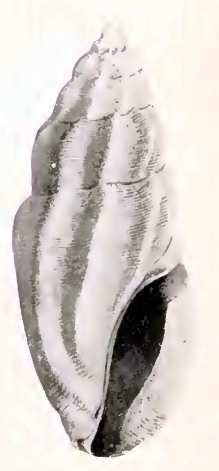
Agathotoma phryne is a species of sea snail, a marine gastropod mollusk in the family Mangeliidae.
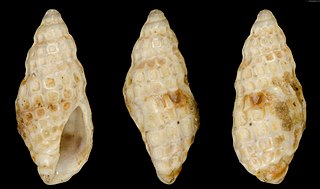
Clathromangelia fuscoligata is a species of sea snail, a marine gastropod mollusk in the family Raphitomidae.

Clathromangelia rhyssa is a species of sea snail, a marine gastropod mollusk in the family Raphitomidae.
Platycythara curta is a species of sea snail, a marine gastropod mollusk in the family Mangeliidae.

Bellaspira melea is a species of sea snail, a marine gastropod mollusk in the family Drilliidae.

Calliclava aegina is a species of sea snail, a marine gastropod mollusk in the family Drilliidae.

Limacina helicina is a species of small swimming planktonic sea snail in the family Limacinidae, which belong to the group commonly known as sea butterflies (Thecosomata).

Limacina rangii is a species of swimming sea snail in the family Limacinidae, which belong to the group commonly known as sea butterflies (Thecosomata).
Clione antarctica is a species of "sea angel", a sea slug, a pelagic marine gastropod mollusk in the family Clionidae, the "sea angels".

The genus Clio is a taxonomic group of small floating sea snails, pelagic marine opisthobranch gastropod mollusks, the sole genus belonging to the family Cliidae
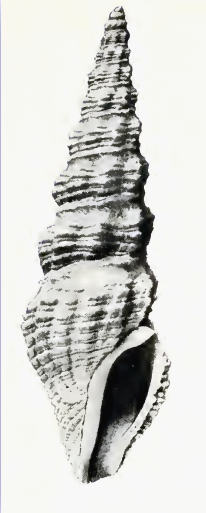
Clathrodrillia callianira is a species of sea snail, a marine gastropod mollusc in the family Drilliidae.
Clione okhotensis is a species of sea angel, a pelagic marine gastropod in the family Clionidae.












